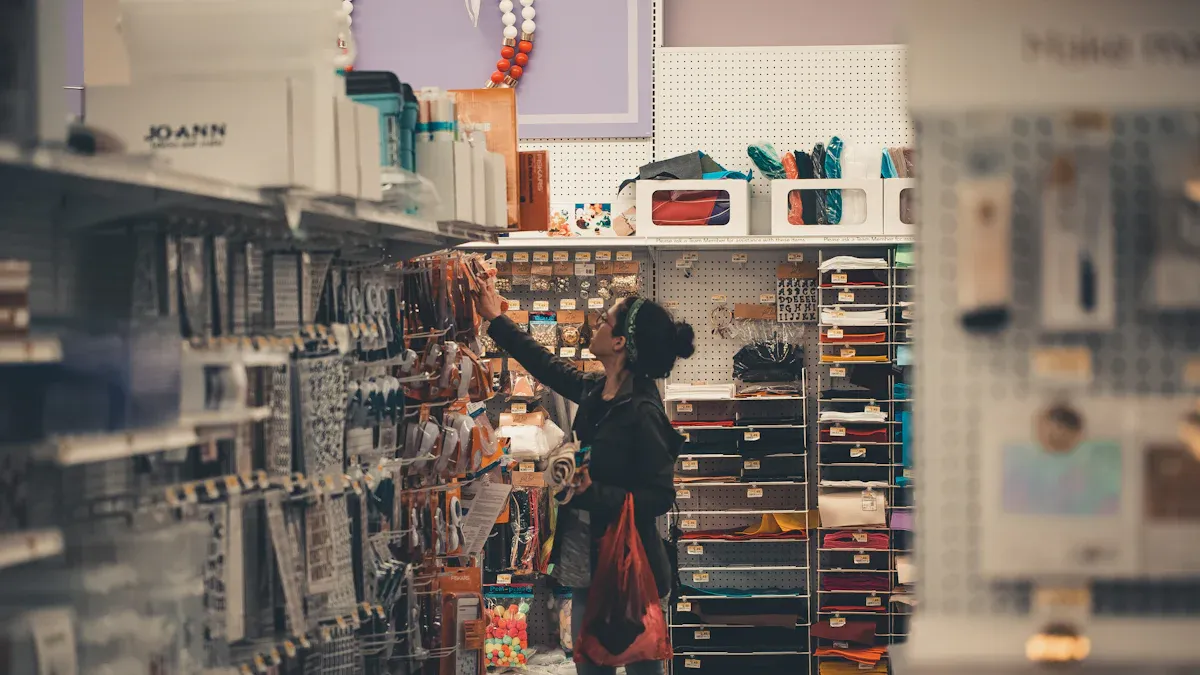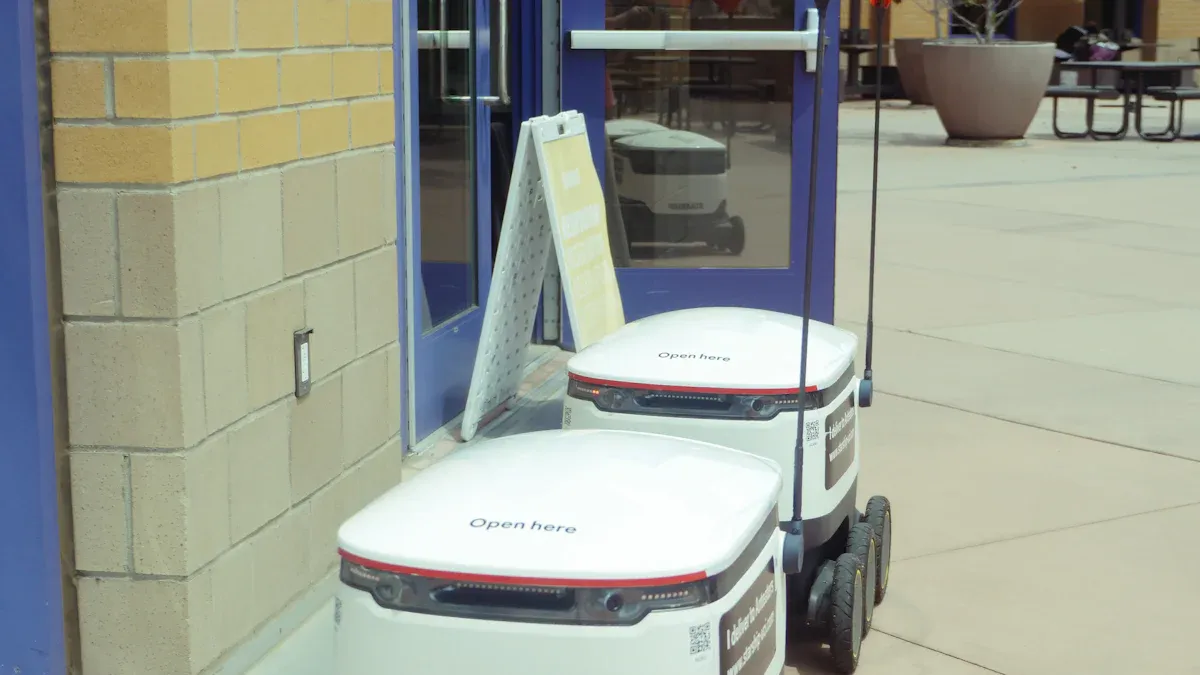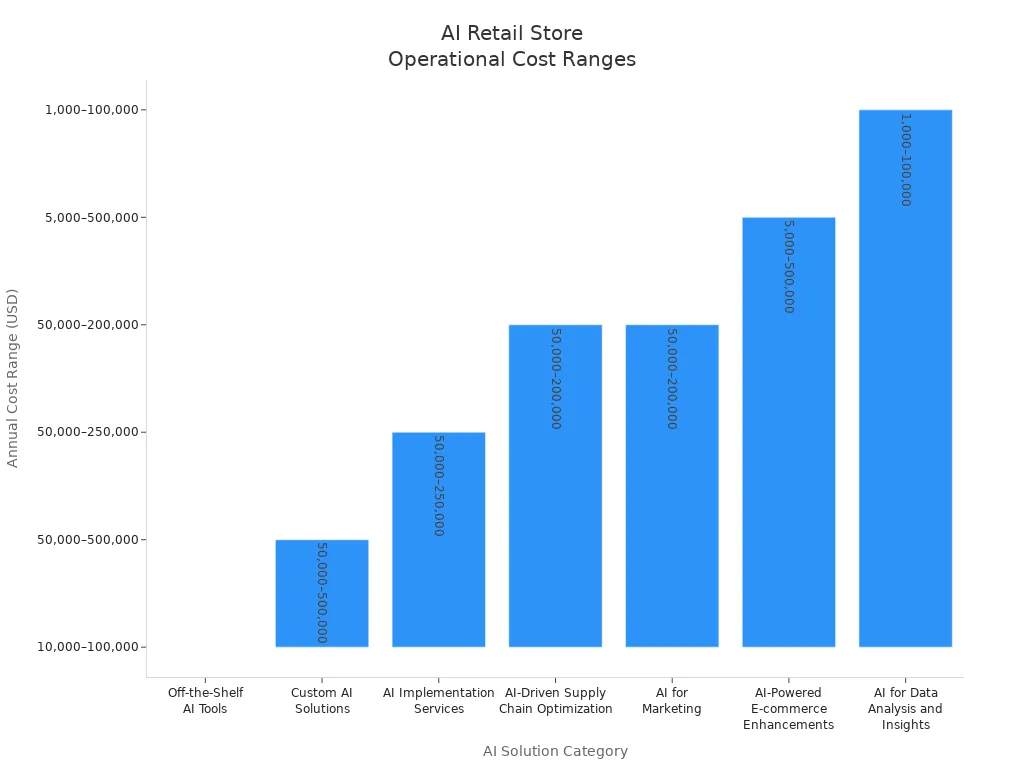Playtech Store vs AI Retail Store: Comparing Business Models

You see big differences between the Playtech Store and AI Retail Store models. The Playtech Store puts digital services at the center of its business. AI Retail Stores use smart technology to give you personalized experiences. Compliance and adaptability matter to both models, but they handle these challenges in unique ways. Technology integration also sets them apart. Many retail businesses now use AI-driven personalization. The table below shows how common these strategies have become.
Statistic | Percentage |
|---|---|
Businesses leveraging AI-driven personalization | |
Retailers using machine learning for personalization | 73% |
Retailers using AI to improve customer experiences | 60% |
Understanding these differences helps you find the best fit for your business goals.
Key Takeaways
Playtech Store focuses on digital services and compliance, making it ideal for online gambling businesses.
AI Retail Stores enhance customer experiences through personalization and automation, leading to higher satisfaction and sales.
Both models use technology differently; Playtech emphasizes security and compliance, while AI Retail prioritizes personalized shopping.
Understanding your business goals helps you choose the right model: Playtech for compliance and digital reach, AI for engagement and automation.
Investing in technology and data quality is crucial for success in either model, as poor data can lead to bad decisions.
Playtech Store Model

Features
You will notice that the Playtech Store stands out from traditional retail models. It focuses on digital services and online gambling. You get a strong online presence and more control over your brand. The Playtech Store lets you manage customer relationships in a personal way. You can also choose products with more flexibility. Return policies are often more accommodating than those in regular stores.
Feature | Playtech Store (D2C) | Traditional Retail |
|---|---|---|
Online Presence | Yes | Limited |
Brand Control | High | Low |
Customer Relationship Management | Personalized | Generic |
Flexibility in Product Selection | High | Limited |
Return Policies | Accommodating | Rigid |
The Playtech Store also puts a big focus on compliance. You must follow strict rules in regulated markets. The store supports you with tools for safer gambling, like deposit limits and self-exclusion. It uses Know Your Customer (KYC) and Customer Due Diligence (CDD) solutions. These help you meet legal requirements and protect players. Products get certified for fairness, and the store checks any problems quickly. Marketing stays responsible and never targets minors.
Compliance Aspect | Description |
|---|---|
Commitment to Compliance | Playtech supports licensees in meeting compliance requirements across all operational markets. |
Tools for Safer Gambling | Offers tools like deposit limits, reality checks, and self-exclusion to ensure player protection. |
KYC and CDD/EDD Solutions | Provides Know Your Customer (KYC) and Customer Due Diligence (CDD) solutions to meet regulatory needs. |
Fairness and Certification | Products are certified to ensure fairness and proper operation, with prompt investigations of incidents. |
Responsible Marketing | Ensures advertising is truthful, not targeted at minors, and promotes responsible gambling as entertainment. |
Revenue Streams
You can earn money in several ways with the Playtech Store. The main source comes from online gambling services. You may also offer digital games, software, and support services. Some stores get revenue from licensing their technology to other companies. You can also see income from marketing partnerships and data analytics services.
Strengths and Weaknesses
You gain many strengths with the Playtech Store model. You get high brand control and strong customer relationships. The store adapts quickly to market changes. Compliance tools help you stay safe in regulated markets. Financial performance often looks strong. For example, the forecasted EBITDA for the first half of 2025 is €90 million, and the reported EBITDA is €92 million. This shows steady growth and value for shareholders.
However, you may face some weaknesses. You must keep up with strict regulations. The market can change fast, and you need to adapt. Competition in online gambling is strong. You also need to invest in technology and compliance tools to stay ahead.
AI Retail Store Model

Features
You experience a new kind of shopping in an AI Retail Store. AI collects and analyzes your data to personalize your experience. You see products and offers that match your interests. The store uses automation to send you messages that feel personal. Customer service becomes faster and more helpful because AI answers questions and solves problems quickly. You can try on clothes virtually with AR tools, which makes shopping easier and less stressful. AI also helps the store manage inventory, so you find what you need when you visit.
AI gathers data from many places to build a complete profile of you.
Personalized recommendations make shopping more enjoyable.
AR experiences let you see how products look before you buy.
Automated communication keeps you informed and engaged.
Fast customer service improves your satisfaction.
Revenue Streams
AI Retail Stores earn money in several ways. You see personalized ads and product suggestions that encourage you to buy. The store uses AI to predict demand, so products are always available. Automation reduces labor costs, which helps the store save money. AI-powered chatbots and virtual assistants improve customer experience, leading to more sales. The store also uses predictive insights to make smart business decisions.
Revenue Stream | AI Retail Stores | Traditional Retail Models |
|---|---|---|
Personalization | Tailored marketing and product suggestions | Generic marketing strategies |
Demand Forecasting | Accurate predictions, optimized stock | Less accurate, historical data |
Automation | Lower labor costs, efficient operations | Manual processes, more staff |
Customer Experience | AI chatbots, virtual try-ons, fast service | Standard customer service |
Competitive Edge | Predictive insights, proactive decisions | Reactive strategies |
Strengths and Weaknesses
You benefit from many strengths in an AI Retail Store. Personalization makes shopping easier and more fun. Automation speeds up service and lowers costs. The store adapts quickly to changes in demand. You get better product availability and faster help. However, you must consider some weaknesses. AI systems need careful monitoring to stay fair and trustworthy. The store must follow strict rules, like those in the EU AI Act, which sorts AI systems by risk level. You may worry about privacy and how your data is used. The store needs to document decisions and communicate clearly with you.
Tip: Look for stores that explain how they use AI and protect your information. This builds trust and helps you feel safe when shopping.
Comparison
Technology Integration
You see technology at the heart of both business models, but each uses it in a different way. In an AI Retail Store, you interact with smart systems that personalize your shopping. These stores use AI to recommend products, manage inventory, and answer your questions. Automation helps you get faster service and better choices.
The Playtech Store focuses on digital platforms for online gambling and gaming. You get secure transactions, strong compliance tools, and a smooth user experience. This store uses technology to protect your data and follow strict rules. Recently, Playtech Store started working with AI partners like Jumio. This partnership brings AI-powered identity checks, making onboarding and compliance easier for you and safer for the business.
Model | Technology Focus | Example Use Cases |
|---|---|---|
AI Retail Store | AI-driven personalization, automation, AR/VR | Product recommendations, virtual try-ons, chatbots |
Playtech Store | Digital platforms, compliance tools, AI integration | Secure payments, KYC, AI identity verification |
Note: Both models use technology to improve your experience, but AI Retail Stores focus more on personalization, while Playtech Store emphasizes security and compliance.
Scalability
When you think about growing your business, scalability matters. AI Retail Stores can expand quickly if you choose the right technology and build trust with customers. You need to make sure the user experience stays smooth as you grow. Following local laws and understanding market needs help you avoid problems.
Here are some key factors that affect how well AI Retail Stores can scale:
Factor | Description |
|---|---|
Technological integration | Picking the right platforms helps you grow faster. |
Consumer acceptance | Building trust in automated shopping encourages more people to try your store. |
User experience | A simple, friendly interface keeps customers coming back. |
Regulatory compliance | Following privacy and AI rules lets you expand into new markets safely. |
Market needs | Knowing what local shoppers want prevents wasted inventory. |
Competition | Balancing new stores with old ones avoids hurting your own sales. |
Access to technology | New tech makes it easier to open more stores and meet customer needs. |
Market conditions | Lower costs during tough times make AI stores more attractive. |
ROI from existing outlets | Profits from current stores help you decide when to open new ones. |
The Playtech Store can also scale, especially in digital markets. You can reach more customers online without opening physical locations. By adding AI solutions, you make onboarding and compliance faster, which supports growth in new regions.
Cost Structure
You need to understand costs before choosing a business model. AI Retail Stores have a range of expenses, from basic AI tools to custom solutions. Small stores might pay $50–$300 per month for simple chatbots. Large retailers may spend over $500,000 to build advanced AI systems. You also pay for integration, support, and data analysis tools.
Category | Examples | Cost Range | Best For |
|---|---|---|---|
Off-the-Shelf AI Tools | Chatbots, recommendation engines | $50–$300/month (basic) | Small to medium retailers |
Custom AI Solutions | Predictive analytics | $50,000–$500,000+ (development) | Large retailers |
AI Implementation Services | IBM Watson, Google AI | $50,000–$250,000 (integration) | End-to-end support |
AI-Driven Supply Chain Optimization | Blue Yonder, project44 | $50,000–$200,000/year | Supply chain optimization |
AI for Marketing | Emarsys, Jasper | $500–$5,000/month (SaaS) | Engagement and ROI |
AI-Powered E-commerce Enhancements | Shopify Magic, ModiFace | $5,000–$50,000 (small-scale) | E-commerce businesses |
AI for Data Analysis and Insights | Tableau, Google Analytics 4 | $1,000–$15,000/year (licensing) | Actionable insights |

The Playtech Store has different costs. You invest in digital platforms, security, and compliance tools. Adding AI for identity checks or customer support can raise costs, but it also improves efficiency and safety. You avoid the high costs of running physical stores, which helps you save money as you grow.
Customer Experience
You want a shopping experience that feels personal and easy. AI Retail Stores use smart systems to learn your preferences. You get product suggestions, real-time messages, and quick support. These stores use three main strategies:
Strategy | Description |
|---|---|
Creating personalized experiences | AI tailors offers and campaigns to your interests. |
Engaging customers in real time | You receive messages and deals while you shop, making your visit more exciting. |
Optimizing customer support | AI chatbots and assistants answer your questions quickly and clearly. |
The Playtech Store also values your experience. You get a secure, user-friendly platform with strong customer support. By adding AI, the store can make onboarding faster and help you with questions at any time. This mix of safety and convenience builds trust and keeps you coming back.
Tip: Look for stores that use technology to make your experience safer, faster, and more personal. This shows they care about your needs and privacy.
Best Use Cases
Playtech Store
You find the Playtech Store model works best in industries where digital services and strict compliance matter. If you operate in online gambling or gaming, this model gives you strong control over your brand and customer relationships. You can quickly adapt to new regulations and market trends. The Playtech Store suits businesses that want to reach customers in regulated markets without the costs of physical locations. You also benefit if you need advanced security and identity verification. This model helps you protect users and build trust, especially when you handle sensitive data or financial transactions.
Tip: Choose the Playtech Store model if you want to scale your digital presence and need robust compliance tools.
AI Retail Store
You see the AI Retail Store model shine when you want to boost customer engagement and personalization. Many shoppers prefer AI-powered support. In fact, 40% of customers like using AI chatbots for help. When you offer personalized experiences, 80% of consumers feel more likely to buy from you. Retailers use AI to analyze real-time behaviors, such as browsing and purchase history, to create detailed customer profiles. Generative AI can even unlock insights from images and customer feedback.
AI chatbots answer questions fast and make shopping easier.
Personalized recommendations encourage repeat purchases.
AI systems help you manage inventory and predict demand.
You can use AI to detect customer sentiment and improve service.
Retailers like Walmart and Amazon have seen big results. Walmart reduced stockouts by 25% and overstocking by 10% with AI demand forecasting. Amazon increased revenue by 10% using AI for dynamic pricing. Stitch Fix achieved a 70% repeat purchase rate with AI styling. Sephora saw a 25% sales jump from an AI chatbot that gave tailored product suggestions. You can use these strategies to improve your own business and keep customers coming back.
You see clear differences between Playtech Store and AI Retail Store models. Playtech Store gives you strong digital control and compliance. AI Retail Stores focus on personalized shopping and automation. When you choose a model, think about these factors:
Personalized customer experiences boost satisfaction and sales.
Automated tools like smart mirrors improve engagement.
Store location and visibility can raise foot traffic by 25%.
Data-driven site selection helps you invest wisely.
AI adoption can lower costs and increase revenue.
Pitfall | Description |
|---|---|
Data Quality | Poor data leads to bad decisions. |
Bias in AI Models | AI can repeat unfair patterns from old data. |
Privacy and Security | Protect customer data and follow rules. |
High Operational Costs | AI can cost more than you expect. |
Network Capacity | Weak networks slow down AI systems. |
Pick the model that matches your goals and resources. If you want strong compliance and digital reach, choose Playtech Store. If you want to boost engagement and use AI, try the AI Retail Store. Always check your data quality and protect customer privacy for long-term success.
FAQ
What is the main difference between a Playtech Store and an AI Retail Store?
You see Playtech Stores focus on digital gambling and compliance. AI Retail Stores use smart technology to personalize your shopping. Both use technology, but their goals and customer experiences differ.
How does AI improve your shopping experience in retail stores?
AI learns your likes and habits. You get product suggestions, fast help from chatbots, and even virtual try-ons. This makes shopping easier and more fun.
Tip: Try using stores with AI features. You may find products you love faster!
Are there risks with using AI in retail?
Yes, you should watch for privacy and data safety. AI can make mistakes or show bias. Stores must follow rules to protect your information.
Risk | What You Can Do |
|---|---|
Privacy | Check store policies |
Bias | Give feedback |
Mistakes | Report problems |
Which business model is better for your company?
You should choose based on your needs. If you want strong compliance and digital reach, pick Playtech Store. If you want more customer engagement and smart automation, try the AI Retail Store.
Playtech Store: Best for online gambling and strict rules
AI Retail Store: Best for personal shopping and automation
See Also
The Future of Retail: Embracing AI-Driven Stores
Understanding the Growth of AI-Enhanced Corner Stores
Starting an AI-Driven Corner Store on a Budget
Modern Retail Benefits from AI-Enabled Combo Vending Machines
Transforming Online Store Management with AI E-Commerce Tools
